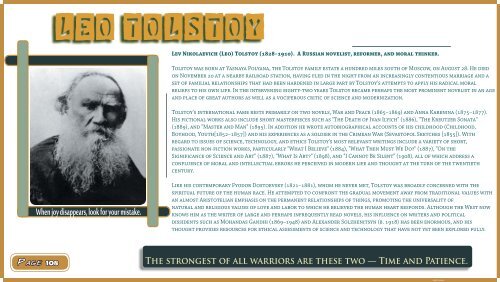Create successful ePaper yourself
Turn your PDF publications into a flip-book with our unique Google optimized e-Paper software.
Leo Tolstoy<br />
Lev Nikolaevich (Leo) Tolstoy (1828–1910). A Russian novelist, reformer, and moral thinker.<br />
Tolstoy was born at Yasnaya Polyana, the Tolstoy family estate a hundred miles south of Moscow, on August 28. He died<br />
on November 20 at a nearby railroad station, having fled in the night from an increasingly contentious marriage and a<br />
set of familial relationships that had been hardened in large part by Tolstoy's attempts to apply his radical moral<br />
beliefs to his own life. In the intervening eighty-two years Tolstoy became perhaps the most prominent novelist in an age<br />
and place of great authors as well as a vociferous critic of science and modernization.<br />
Tolstoy's international fame rests primarily on two novels, War and Peace (1865–1869) and Anna Karenina (1875–1877).<br />
His fictional works also include short masterpieces such as "The Death of Ivan Ilyich" (1886), "The Kreutzer Sonata"<br />
(1889), and "Master and Man" (1895). In addition he wrote autobiographical accounts of his childhood (Childhood,<br />
Boyhood, Youth[1852–1857]) and his experiences as a soldier in the Crimean War (Sevastopol Sketches [1855]). With<br />
regard to issues of science, technology, and ethics Tolstoy's most relevant writings include a variety of short,<br />
passionate non-fiction works, particularly "What I Believe" (1884), "What Then Must We Do" (1887), "On the<br />
Significance of Science and Art" (1887), "What Is Art" (1898), and "I Cannot Be Silent" (1908), all of which address a<br />
confluence of moral and intellectual errors he perceived in modern life and thought at the turn of the twentieth<br />
century.<br />
When joy disappears, look for your mistake.<br />
Like his contemporary Fyodor Dostoevsky (1821–1881), whom he never met, Tolstoy was broadly concerned with the<br />
spiritual future of the human race. He attempted to confront the gradual movement away from traditional values with<br />
an almost Aristotelian emphasis on the permanent relationships of things, promoting the universality of<br />
natural and religious values of love and labor to which he believed the human heart responds. Although the West now<br />
knows him as the writer of large and perhaps infrequently read novels, his influence on writers and political<br />
dissidents such as Mohandas Gandhi (1869–1948) and Alexander Solzhenitsyn (b. 1918) has been enormous, and his<br />
thought provides resources for ethical assessments of science and technology that have not yet been explored fully.<br />
Page 108<br />
The strongest of all warriors are these two — Time and Patience.<br />
Abhi Sharma


